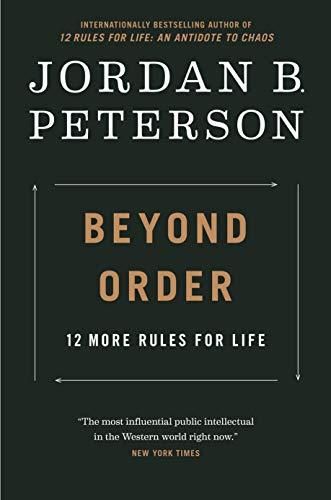Best-selling cosmic advice-giver and moralist Jordan B. Peterson offers 12 more insightful, applicable, hard-nosed rules for living a fulfilled life. The only kind, he contends, worth living.

It Ain’t Easy
Controversial psychologist and reluctant sage to the rudderless, Jordan B. Peterson follows up on his 2018 bestseller 12 Rules for Life with an additional dozen rules in Beyond Order. The text harnesses myth, the Bible and enlightened thought as tools for exploring life’s confounding yet vitalizing contradictions. Peterson eviscerates ideology and urges you to appreciate beauty, be courageous in the face of tragedy, take responsibility for your actions, and embrace the sublime within and without yourself. Unsentimental yet captivatingly blunt, Peterson offers stern, transcendent advice for perilous times.
Reasonable Conservatism versus Creative Transformation
Peterson’s first rule establishes the importance of both social institutions and creative achievement. People need to spend time with others to keep their minds organized, hold onto their memories, judge their actions and ensure they function in reality, not fantasy. To determine what society believes is beneficial, people must agree on what constitutes society’s problems and formulate practical solutions. These solutions constitute the “natural ethics” that form the institutions that govern people. They are not the perfect solutions, but society relies on them to function properly.
Genie – genius – is the combination of possibility and potential, and extreme constraint.Jordan B. Peterson
Peterson believes that society observes two “natural laws” that guide its evolution: reasonable conservatism and creative transformation. The former depends on order, the latter on chaos. Conservative people cleave to the past as creatives hasten to the future. Embracing both laws, in moderation, has value. Blind obedience is always bad; so is mindless destruction.
Who Are You?
The second rule clarifies who you are and who you could be. Unforgettable stories inform human society. The hero’s journey, the great romance, and the battle between good and evil engrave moral lessons onto the collective psyche. You don’t get to choose what matters to you; it chooses you. Something compels you forward: Love for a person or an endeavor, or a passion for beauty or justice.
Peterson explains that civilization emerges through the process of contemplating and determining humanity’s most important principles, and formalizing them in stories and beliefs. Myth and ritual become religion as stories become sacred. To overcome evil, the mythic hero may have to die to move the human story forward. But there is always a rebirth, because the story never ends. Peterson urges you to get your own story straight and fulfill your quest, because you alone are the hero of your story.
Self-Deception
Rule number three posits that you cannot indefinitely repress the destructive effects of self-deception. Sigmund Freud pointed out how people deceive themselves via sublimation, projection, denial and displacement. But, Peterson argues, he did not account for sins of omission – which are as ruinous as sins of commission – or that people seldom understand their own behavior. Self-deceptions, intended or not, Peterson warns, bring catastrophic consequences. He advises seeking out the “why” of your past events; that exploration leads to wisdom. If you fail to seek the “why,” you risk becoming inauthentic, resentful and spiritually impoverished.
There will be times in your life when it will take everything you have to face what is in front of you, instead of hiding away from a truth so terrible that the only thing worse is the falsehood you long to replace it with.Jordan B. Peterson
Peterson urges you to acknowledge when you’re afraid. Fear raises the difficulty of asking for what you need and want. You might think that if you don’t ask, you won’t experience disappointment. Peterson assures you that to ask for something and not get it every time is better than never asking and never getting what you want. Communicating what you want, how you feel and why you feel a certain way requires trust and humility, which takes courage. Your reward is self-knowledge and truth.
Ideology
Peterson believes that ideologues are worse than religious fundamentalists because they claim their theories are rational and demonstrable. Their ideology explains everything, across all time, and they take pride in their omniscience. When the ideology fails, however, they find people to blame. And when you fail, you may claim victimhood. If money is your problem, the wealthy are to blame. If you feel powerless, others hoard all the power. Then you believe the sources of your pain must suffer eradication. You fail to recognize the struggle between good and evil within yourself, so you project that pain onto others. To be an adult, Peterson challenges you to accept responsibility for your actions and abandon ideology.
Clean Your Room and Appreciate Beauty.
Of course, a clean room gives you a sense of order, but beyond order lies beauty, which links you to the sublime. Peterson encourages you to notice the beauty in the world around you. Art shows you the transcendent, so the author invites you to buy original art, if you can afford it.
Artists must be contending with something they do not understand, or they are not artists.Jordan B. Peterson
When you bring art into your life, Peterson says, you share the artist’s vision and understanding. Art and beauty are among life’s greatest joys. Beautify one room in your life, and maintain its order as a shrine to the sublime.
The Past
To recover from trauma, Peterson insists that you map the past to investigate what happened to you. Avoiding this, he warns, leaves you fearful and stuck in the past. When you fear the future because you refuse to confront the past, you relegate yourself to hell – where you practice deceit and avoidance.
Anything sufficiently threatening or harmful, once encountered, can never be forgotten if it has never been understood.Jordan B. Peterson
Your values can define your actions; your conscience will remind you when you deceive yourself and others. If you don’t confront the terrors of your past, the chaos they created will haunt your present and future. Peterson’s next rule states you should discover how you may have contributed to your own suffering. Your torment may contain the seeds of your salvation.
Gratitude
Peterson believes that you have a remarkable capacity to survive and transcend suffering. Facing terrible things with courage and nobility enables you to help yourself and others. Never rationalize your worst habits, but, instead, listen to your conscience.
Courage and nobility in the face of tragedy is the reverse of the destructive, nihilistic cynicism apparently justified under just such circumstances.Jordan B. Peterson
Peterson encourages you to be the strong person others lean on. Practice gratitude. When you love instead of hate, and accept life’s burdens instead of embracing cynicism and despair, you improve the world. Love other people not in spite of their limitations, but because of them. It is a miracle that, in a world beset by danger, disappointment and death, love and trust endure. Yet Peterson is sure they do.
Tough Love
Peterson synthesizes C.G. Jung, the Bible, mythology and tough common sense to lay out a remarkably clear diagram of what you – and everybody else – must do to become the strongest, most honest manifestation of yourself. He never claimed this quest was easy; he only insists, page after page, that it is essential. An intelligent, perceptive cliché-avoidant self-help book may seem an oxymoron, but here it is. Peterson neither condescends nor preaches and his hard-nosed humor and ease with language and concepts deliver his message with grace.
Jordan B. Peterson also wrote Maps of Meaning, and 12 Rules for Life, which sold more than five million copies worldwide.




